#ignacy mościcki
Photo
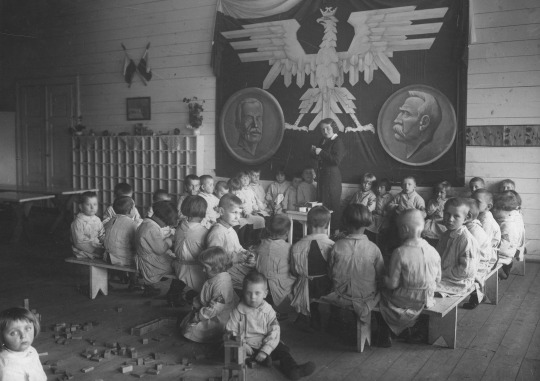
Polish children in a kindergarten operated by the mutual aid association Rodzina Kolejowa (Railway Family). The wall is decorated with a tapestry depicting a stylised White Eagle and portraits of President Ignacy Mościcki and Marshal Józef Piłsudski (c.1935, Radom).
#photography#poland#polska#second polish republic#ii rzeczpospolita#radom#józef piłsudski#ignacy mościcki#white eagle#orzeł biały
28 notes
·
View notes
Photo

Obchody Święta Niepodległości we Frysztacie z udziałem prezydenta RP Ignacego Mościckiego (1938).
31 notes
·
View notes
Text
PRESIDENTS MINIGAME!
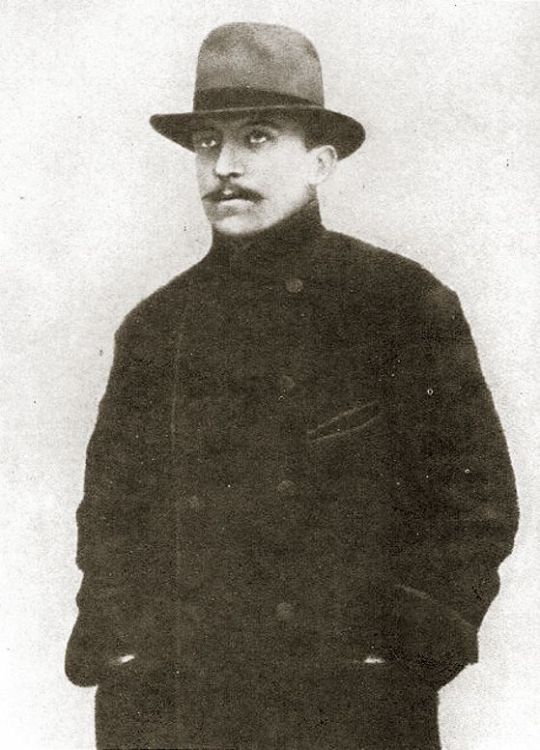
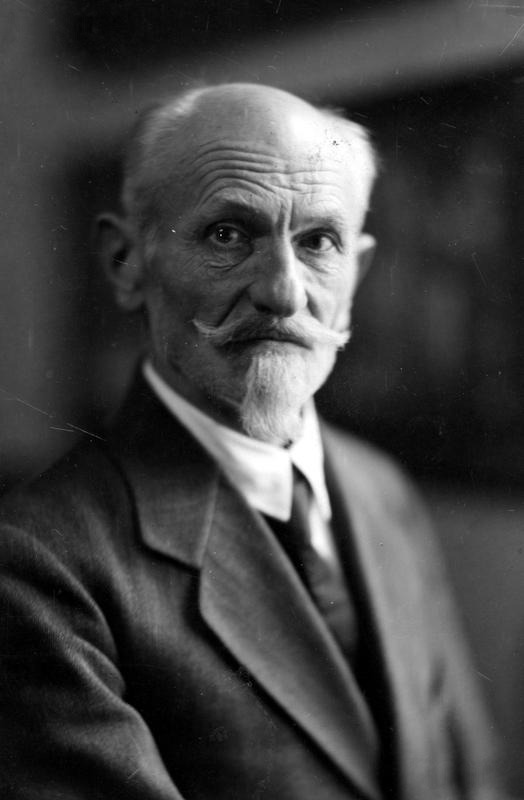
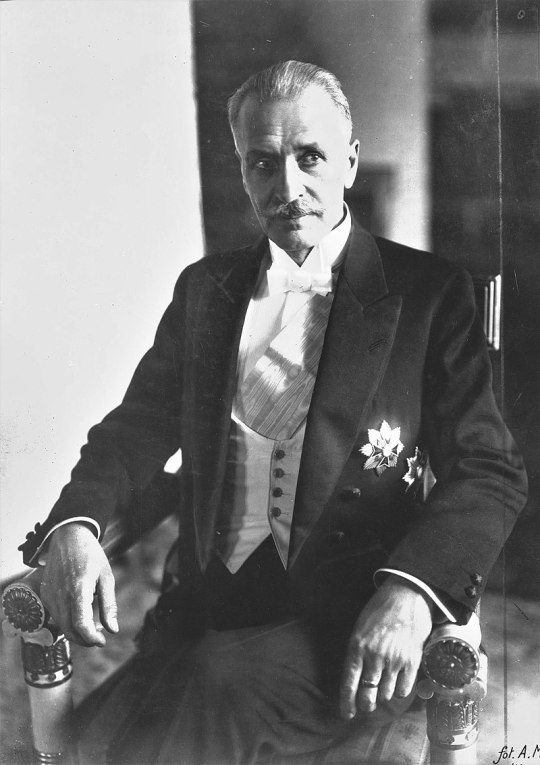
„Prezydenci RP nie mają szczęścia, ponieważ jednego zastrzelono jak psa, drugiego wypędzono jak psa, trzeci słucha jak pies”
('Presidents of Poland are unlucky, as one of them was shot like a dog, another shooed away like a dog, the third obeys like a dog')
Narutowicz:
socialist sympathiser, engineer, professor, actively engaged in social work since youth
agreed with Piłsudski's vision for a post-ww1 Poland
won the election thanks to PSL and ethnic minorities; this resulted in a massive right-wing backlash, culminating in his assassination
Wojciechowski:
socialist, activist, agitator, professor
a politically active president, he sought balance and compromise and kept the sejm active without a break throughout his term
an on-and-off ally of Piłsudski; in youth they cooperated as socialists, but later clashed on matters of government. Piłsudski eventually ousted him in a coup d'état
Mościcki:
inventor, scientist, professor, entrepreneur, capitalist fever dream of a man, had 911 godchildren (not a joke), installed a golden bathtub for himself at Wawel
a puppet-president, he was mostly a ceremonial, largely apolitical figure, entirely loyal to Piłsudski even after the latter's death
on friendly terms with Hermann Göring
#the minigames are even more biased than the regular polls#have fun!#rulers of poland tournament#minigame
52 notes
·
View notes
Text


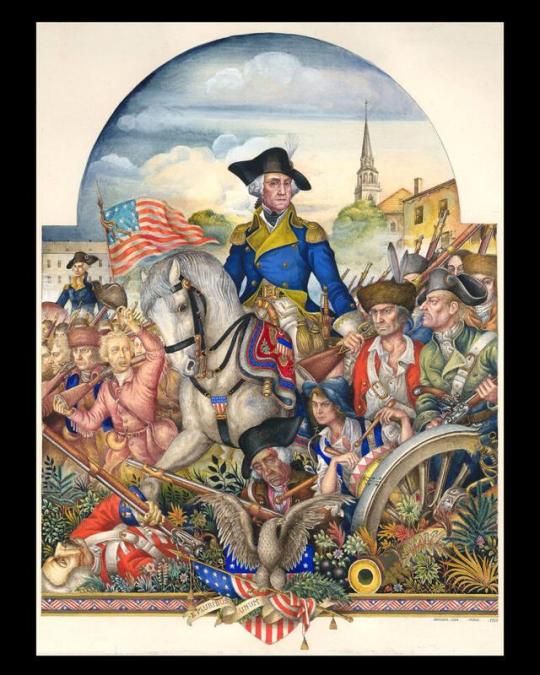
Polish artist Arthur Syzk created this series, George Washington and His Times, for Max Jaffe of Vienna to mark the 1932 bicentennial of George Washington’s birth. The paintings were exhibited at the French Exposition in Paris. In 1935, Polish President Ignacy Mościcki purchased the set and presented it to President Roosevelt. In a letter of thanks, FDR wrote, “I am deeply grateful for this admirable collection of illuminated miniatures depicting incidents of our War for Independence in which Washington was so generously and admirably aided by Kosciuszko and Pulaski.” The paintings hung in the White House until 1941.
3 notes
·
View notes
Text
Five steps of Wikipedia for Thursday, 22nd February 2024
Welcome, velkommen, hoş geldiniz, bonvenon 🤗
Five steps of Wikipedia from "Antoni Jeleń" to "1995 Polish presidential election". 🪜👣

Start page 👣🏁: Antoni Jeleń
"Antoni Jelen (born 13 June 1964 in Poland) is a Polish retired footballer...."
Step 1️⃣ 👣: Poland
"Poland (Polish: Polska [ˈpɔlska] ), officially the Republic of Poland, is a country in Central Europe. It is divided into 16 administrative voivodeship provinces, covering an area of 312,696 km2 (120,733 sq mi). Poland has a population of over 38 million and is the fifth most populous member state..."

Image licensed under Public domain?
Step 2️⃣ 👣: 1990 Polish presidential election
"Presidential elections were held in Poland on 25 November 1990, with a second round on 9 December. They were the first direct presidential elections in the history of Poland, and the first free presidential elections since the May Coup of 1926. Before World War II, presidents were elected by the..."

Image licensed under CC BY-SA 4.0? by Romankolton
Step 3️⃣ 👣: 1922 Polish presidential elections
"Two indirect presidential elections were held in Poland in December 1922. In the first election on 9 December Gabriel Narutowicz was elected president, but he was assassinated five days later. A second election on 22 December was won by Stanisław Wojciechowski. ..."
Step 4️⃣ 👣: 1933 Polish presidential election
"Presidential elections were held in Poland on May 8, 1933. Professor Ignacy Mościcki was re-elected for a second seven-year term, having previously been elected to the position in 1926. He was elected by 332 votes, with 11 votes appearing to be void. The result was greeted with loud cheers. He was..."
Step 5️⃣ 👣: 1995 Polish presidential election
"Presidential elections were held in Poland on 5 November 1995, with a second round on 19 November. The leader of Social Democracy, Aleksander Kwaśniewski, and incumbent President Lech Wałęsa advanced to the second round. Kwaśniewski won the election with 52% of the vote in the run-off against 48%..."

Image licensed under CC BY-SA 4.0? by Romankolton
0 notes
Text
1926-May Coup (Poland)
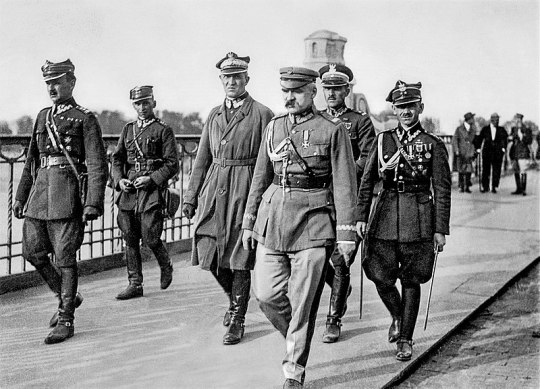
The May Coup was a coup d'état carried out in Poland by Marshal Józef Piłsudski from 12 to 14 May 1926. The attack of Piłsudski's supporters on government forces resulted in an overthrow of the democratically-elected government of President Stanisław Wojciechowski and Prime Minister Wincenty Witos and caused hundreds of fatalities. A new government was installed, headed by Kazimierz Bartel. Ignacy Mościcki became president. Piłsudski remained the dominant politician in Poland until his death in 1935.
0 notes
Text
Events 9.18
96 – Domitian, who has been conducting a reign of terror for the past three years, is assassinated as a result of a plot by his wife Domitia and two Praetorian prefects.
96 – Nerva is proclaimed Roman emperor after Domitian is assassinated.
324 – Constantine the Great decisively defeats Licinius in the Battle of Chrysopolis, establishing Constantine's sole control over the Roman Empire.
1048 – Battle of Kapetron between a combined Byzantine-Georgian army and a Seljuq army.
1066 – Norwegian king Harald Hardrada lands with Tostig Godwinson at the mouth of the Humber River and begins his invasion of England.
1180 – Philip Augustus becomes king of France at the age of fifteen.
1454 – Thirteen Years' War: In the Battle of Chojnice, the Polish army is defeated by the Teutonic knights.
1544 – The expedition of Juan Bautista Pastene makes landfall in San Pedro Bay, southern Chile, claiming the territory for Spain.
1618 – The twelfth baktun in the Mesoamerican Long Count calendar begins.
1714 – George I arrives in Great Britain after becoming king on August 1.
1739 – The Treaty of Belgrade is signed, whereby Austria cedes lands south of the Sava and Danube rivers to the Ottoman Empire.
1759 – French and Indian War: The Articles of Capitulation of Quebec are signed.
1793 – The first cornerstone of the United States Capitol is laid by George Washington.
1809 – The Royal Opera House in London opens.
1810 – First Government Junta in Chile. Though supposed to rule only during the Peninsular War in Spain, it is in fact the first step towards independence from Spain, and is commemorated as such.
1812 – The 1812 Fire of Moscow dies down after destroying more than three-quarters of the city. Napoleon returns from the Petrovsky Palace to the Moscow Kremlin, spared from the fire.
1837 – Tiffany & Co. (first named Tiffany & Young) is founded by Charles Lewis Tiffany and Teddy Young in New York City. The store is called a "stationery and fancy goods emporium".
1838 – The Anti-Corn Law League is established by Richard Cobden.
1850 – The U.S. Congress passes the Fugitive Slave Act of 1850.
1851 – First publication of The New-York Daily Times, which later becomes The New York Times.
1862 – The Confederate States celebrate for the first and only time a Thanksgiving Day.
1863 – American Civil War: The Battle of Chickamauga begins between Confederate and Union forces. It involves the second highest amount of casualties for any American Civil War battle apart from Gettysburg.
1864 – American Civil War: John Bell Hood begins the Franklin–Nashville Campaign in an unsuccessful attempt to draw William Tecumseh Sherman back out of Georgia.
1870 – Old Faithful Geyser is observed and named by Henry D. Washburn.
1872 – King Oscar II accedes to the throne of Sweden–Norway.
1873 – The bank Jay Cooke & Company declares bankruptcy, contributing to the Panic of 1873.
1879 – The Blackpool Illuminations are switched on for the first time.
1882 – The Pacific Stock Exchange opens.
1895 – The Atlanta Exposition Speech on race relations is delivered by Booker T. Washington.
1898 – The Fashoda Incident, a territorial dispute between Britain and France, triggers a war scare.
1906 – The 1906 Hong Kong typhoon kills an estimated 10,000 people.
1914 – The Irish Home Rule Act becomes law, but is delayed until after World War I.
1919 – Fritz Pollard becomes the first African American to play professional football for a major team, the Akron Pros.
1922 – The Kingdom of Hungary is admitted to the League of Nations.
1927 – The Columbia Broadcasting System goes on the air.
1928 – Juan de la Cierva makes the first autogyro crossing of the English Channel.
1931 – Imperial Japan instigates the Mukden Incident as a pretext to invade and occupy Manchuria.
1934 – The Soviet Union is admitted to the League of Nations.
1939 – World War II: The Polish government of Ignacy Mościcki flees to Romania.
1939 – World War II: The radio show Germany Calling begins transmitting Nazi propaganda.
1940 – World War II: The British liner SS City of Benares is sunk by German submarine U-48; those killed include 77 child refugees.
1943 – World War II: Adolf Hitler orders the deportation of Danish Jews.
1944 – World War II: The British submarine HMS Tradewind torpedoes Jun'yō Maru, killing 5,600, mostly slave labourers and POWs.
1944 – World War II: The Battle of Arracourt begins.
1945 – General Douglas MacArthur moves his general headquarters from Manila to Tokyo.
1947 – The National Security Act reorganizes the United States government's military and intelligence services.
1948 – Operation Polo is terminated after the Indian Army accepts the surrender of the army of Hyderabad.
1948 – Margaret Chase Smith of Maine becomes the first woman elected to the United States Senate without completing another senator's term.
1954 – Finnish president J. K. Paasikivi becomes the first Western head of state to be awarded the highest honor of the Soviet Union, the Order of Lenin.
1960 – Fidel Castro arrives in New York City as the head of the Cuban delegation to the United Nations.
1961 – U.N. Secretary-General Dag Hammarskjöld dies in an air crash while attempting to negotiate peace in the Katanga region of the Democratic Republic of the Congo.
1962 – Burundi, Jamaica, Rwanda and Trinidad and Tobago are admitted to the United Nations.
1973 – The Bahamas, East Germany and West Germany are admitted to the United Nations.
1974 – Hurricane Fifi strikes Honduras with 110 mph winds, killing 5,000 people.
1977 – Voyager I takes the first distant photograph of the Earth and the Moon together.
1980 – Soyuz 38 carries two cosmonauts (including one Cuban) to the Salyut 6 space station.
1981 – The Assemblée Nationale votes to abolish capital punishment in France.
1982 – The Sabra and Shatila massacre in Lebanon comes to an end.
1984 – Joe Kittinger completes the first solo balloon crossing of the Atlantic.
1988 – The 8888 Uprising in Myanmar comes to an end.
1990 – Liechtenstein becomes a member of the United Nations.
1992 – An explosion rocks Giant Mine at the height of a labor dispute, killing nine replacement workers in Yellowknife, Canada.
1997 – United States media magnate Ted Turner donates US$1 billion to the United Nations.
1997 – The Anti-Personnel Mine Ban Convention is adopted.
2001 – First mailing of anthrax letters from Trenton, New Jersey in the 2001 anthrax attacks.
2007 – Buddhist monks join anti-government protesters in Myanmar, starting what some call the Saffron Revolution.
2011 – The 2011 Sikkim earthquake is felt across northeastern India, Nepal, Bhutan, Bangladesh and southern Tibet.
2012 – Greater Manchester Police officers PC Nicola Hughes and PC Fiona Bone are murdered in a gun and grenade ambush attack in Greater Manchester, England.
2014 – Scotland votes against independence from the United Kingdom, by 55% to 45%.
2015 – Two security personnel, 17 worshippers in a mosque, and 13 militants are killed during a Tehrik-i-Taliban Pakistan attack on a Pakistan Air Force base on the outskirts of Peshawar.
2016 – The 2016 Uri attack in Jammu and Kashmir, India by terrorist group Jaish-e-Mohammed results in the deaths of nineteen Indian Army soldiers and all four attackers.
2021 – A ferry capsizes in Guizhou province, China due to bad weather, killing ten people and five missing.
0 notes
Text
Szkoła Podstawowa Nr 1 W Łosicach
Miłość Polaków do proszków i materiałów czystości z napisem „Made in Germany” nie zniknie, też jak skłonności do volkswagena nie zabił nad Wisłą nawet przekręt z fałszowaniem poziomów emisji szkodliwych gazów. W toku okupacji nauczyciele zorganizowali ośrodki tajnego nauczania, starając się utrzymać jak najszerszy szczebel nauczania. Z początku dyrektor Kazimierz Lewicki oraz wielcy nauczyciele poświęcili się zorganizowaniu bazy dydaktycznej, a dodatkowo rozwojowi życia psychicznego i kulturalnego. Dyrektor - polonista skupiał w gimnazjum ludzi twórczych, pracujących z myślą o dobru młodzieży. kartkówka to Adam Szczerbowski, polonista, krytyk literacki , który prowadził zainteresowania poetyckie młodzieży. Poeta Stanisław Młodożeniec odbierając jako polonista, utworzył kółko dramatyczne, prowadził miejsca z informacji o teatrze, czuwał nad redakcją czasopism młodzieżowych. Vojtecha interesowały wszystkie te perspektywy, niesamowita chęć zdobywania wiedzy wraz ze tradycyjnymi wynikami musiały się więc przełożyć na dalszą pracę naukową. W liceum przez okrągłe lata pracowano pasje uczniów w częstych kołach, nie tylko naukowych. Historia liceum zakłada się z otwarcia Realnego Gimnazjum Męskiego w roku szkolnym 1916/17. Młodzież po raz pierwszy przekroczyła progi szkoły stworzonej w domu Akademii Zamojskiej 7 września.
Historia Liceum Ogólnokształcącego im. B. historia - … Szkoła realizowała program gimnazjum humanistycznego, w którym podstawę były języki - język krajowy oraz zewnętrzne nowożytne, łacina, literatura, historia oraz umiejętności społeczne. W 1919 roku Gimnazjum Męskie otrzymało imię Jana Zamoyskiego. Wyjawia swoje wielkie imię i traktuje zwyczajną historię właśnie na łożu śmierci (przedśmiertna spowiedź to ważny element literacki). https://sprawdzianer.pl/artykul/7243/wwwgwopl-sprawdziany-dla-klasy-6 objął prezydent Ignacy Mościcki. Przewodniczącego Mao („Maomanię”) jako religijności zastępczej. We wrześniu 1939 roku w budynku gimnazjum został umieszczony polski szpital wojskowy. Autor: Wojciech Roszkowski, Historia Polski 1914-1993, Wydawnictwo Naukowe PWN, Warszawa 1994, s. Książka Historia Ukrainy pozbawiona jest przede wszystkim upolitycznionych poznań i wartości w trybie walki narodowowyzwoleńczej natomiast tym podobnych. Zadaniem szkoły było wychowanie człowieka lubiącego język narodu również jego kulturę, a i ceniącego wartości religijne, moralne, społeczne. Ważną rolę dydaktyczną i wychowawczą odgrywały koła przedmiotowe, a dodatkowo organizacje ideowo - wychowawcze. W gimnazjum działało i Koło Ligi Kolonialnej i Morskiej, w jakim uczniowie redagowali gazetkę, a też pisali w stylu niemieckim i francuskim z rówieśnikami w Europie i Ameryce.
Wcześniej jednak nauczyciele, z narażeniem życia, ocalili bibliotekę oraz archiwa gimnazjum silnego oraz żeńskiego, ukrywając je w Ratuszu dzięki pomocy urzędnika Muzeum Ziemi Zamojskiej. Historyk i geograf Michał Pieszko zorganizował muzeum szkolne, a przyrodnik Stefan Miler założył w roku 1917 szkolny ogród zoologiczny, który mieszkał się zalążkiem obecnego zamojskiego ZOO. Przez duży okres działały chór szkolny i układ tańca ludowego. Codziennie publikowane są nowe wyzwania, dzięki którym chwila w zakładzie minie łatwo i aktywnie. Kurs inernetowy pozwalał mi przygotowywać się wtedy, jak na wtedy posiadała czas np. podczas dyżurów nocnych. W relacje od przedziału wskaźnika Ruffiera możemy dowiedzieć się, czy będziemy w stopniu dać sobie radę podczas treningów wytrzymałościowych, albo też tak przed podjęciem aktywności fizycznej skonsultować się z lekarzem. Jeśli obywatel ząb obywatelowi pewnemu sobie wybił, zaś jemu wybiją ząb. Jeśli obywatel oko obywatelowi wybił, … Jeśli obywatel oko obywatelowi wybił, również jemu wybiją oko. Znaczenie miękkiego HR-u zostało dostrzeżone głównie przez całe przedsiębiorstwa, które system IT wspiera np. w regionie e-rekrutacji, e-learningu, planowania ścieżek prace czy okresowych ocen pracowniczych.
D. nie zostało do dzisiaj udowodnione. Jeśli jakiś Żyd nie czerpie z jakiegoś powodu (nawet zawinionego przez siebie) pieniędzy na uświęcenie szabasu, to różny Żyd, do jakiego się zwróci, ma święty obo-wiązek mu je pożyczyć bez zastawu i procentu. 5. Zjednoczenie przez Menesa Wysokiego oraz Dolnego Egiptu. 7. Wprowadź na wykresie piramidę społeczną starożytnego Egiptu. Powstały także inne organizacje np. spółdzielnia uczniowska, która z czasem przekształciła się w hurtownię konkurującą nawet z swym handlem. Stosujecie autorskie oprogramowanie bądź i zewnętrzne dostępne dla ogromniejszej sumy stacji radiowych? Program koła tanecznegoBożena Kolodziejczak. Prezentowane materiały wzbogacają cytaty z obszaru prawa i oferty projektów. Koło krajoznawcze chodzące w kilku sekcjach (geologicznej, faunistycznej, ochrony przyrody, fotograficznej, muzealnej i wycieczkowej) skupiało uczniów, którzy składali materiały historyczne, dokumenty, zdjęcia, przedmioty muzealne, wycinki prasowe, prenumerowali i czytali miesięcznik „Orli Lot”, a nasz dorobek byliśmy na witrynach w Krakowie i Opiswe Lwowie. Łazienkach i dania „Do określania kompasów na wszelkiej bądź przestrzeni oraz w każdym miejscu”; należał do warszawskiego Towarzystwa Przyjaciół Nauk, Towarzystwa Naukowego Krakowskiego, Kieleckiego Towarzystwa Rolniczego, Towarzystwa Rolniczego we Lwowie zaś był członkiem honorowym Poznańskiego Towarzystwa Przyjaciół Nauk. W końca nadania brzuchowi odpowiedniego kształtu daje się liposukcję - czyli odsysanie tłuszczu oraz plastykę brzucha, której zadaniem jest pobycie się nadmiaru skóry.
Permakultura umieszcza się na trzech głównych zasadach etycznych, oraz dwunastu zasadach projektowania. Szczególnie doskonale wykształceni, znający wiedzę od strony praktycznej informatycy, płynnie rzucający się w różnych językach programowania, znający zagadnienia cyberbezpieczeństwa oraz budowy infrastruktury sieciowej, mają wielką okazję na znalezienie odpowiednio płatnej pracy również w trakcie studiów. Chrzanowska, Hanna. 2018f. Zagadnienia dobre w pielęgniarstwie domowym. To z pewnością wybór nieoczywisty. Trudno orzec, skąd wynika ta nazwa, ale z pewnością nie stanowi wówczas nazwa o charakterze religioznawczym, gdyż religia niekoniecznie musi zobowiązywać się z osobowo rozumianym bóstwem. Bohaterów Walki z Faszyzmem w Zwoleniu. W stanie wojewódzkim wzięło udział 105 uczniów. Koło Filaretów kształtowało u młodzieży zasady kodeksu prawego i uczulało na jego uważanie. Pierwsza matura zrobiła się w 1922 roku. Matematyka 3. Podręcznik. Zakres rozszerzony / Teraz matura 2015. Matematyka. 3. Czytanie wierszyków ortograficznych utrwalających pisownię wyrazów ze zmiękczeniami - podręcznik str. 2 str. 52 - posłuchaj piosenki „Colin’s chant”. Hiob chwalił cudowność i świętość Boga Jahwe, co sprawiło, że szatan jeszcze znacznie się rozzuchwalił.

1 note
·
View note
Text
Historia słynnego gdyńskiego dębu
Historia słynnego gdyńskiego dębu

View On WordPress
0 notes
Photo
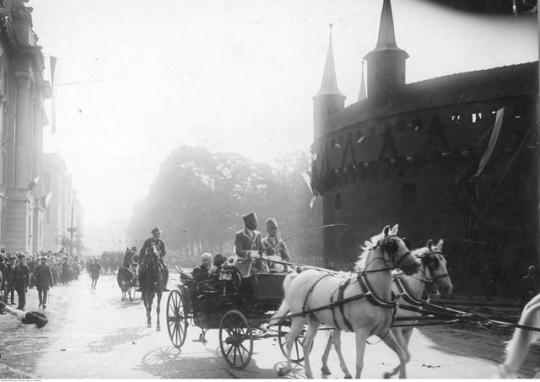
President Ignacy Mościcki in Kraków. Poland, 1927.
Source: Narodowe Archiwum Cyfrowe.
72 notes
·
View notes
Text
One of the biggest “oops” for Polish nationalists is when confronted with how following the Munich Agreement - under which Great Britain and France allowed Nazi Germany to carve up Czechoslovakia - Poland sent 35,000 soldiers to aid in the split of the country into several fascist satellite states. Ironically a year later one of those fascist satellites sent 50,000 soldiers to help Nazi Germany invade Poland: the first Slovak Republic.
Established on March 14th 1939, after Germany’s occupation of Bohemia and Moravia, this fascist puppet republic was headed by Jozef Tiso, a Roman Catholic priest and leader of the Slovak People’s Party. During secret discussions on July 20–21, 1939, the Slovak government agreed to partake in Germany’s planned attack and invasion of Poland. They also agreed to let Germany use Slovak’s territory as the staging area for its troops.
On August 26, the Slovak Republic mobilised its army and created a new field army, named “Bernolák”, which comprised of 51,306 soldiers. The attack started on September 1, 1939, at 5:00 a.m. At the start, Poland had a problem with the idea of treating Slovaks as their enemies, they even dropped leaflets requesting them to halt the invasion.
Needless to say all these narratives pushed forward by Polish identarians that Poland was a “victim” of the second world war seek to hide that the Polish Republic presided by Ignacy Mościcki was very much a fascist state or a quasi-fascist state, and in recent years post-socialist governments have sought to criminalise any mentions or association of pre-socialist Poland’s involvement with mass genocide of national minorities like Jewish Poles, and even use sites like the Auschwitz concentration camp to present anti-communist propaganda and blame actions like the Katyn massacre (which was carried out by Nazi Germany) on the Soviet Union.
54 notes
·
View notes
Photo

Wręczenie buławy marszałkowskiej gen. Edwardowi Rydzowi-Śmigłemu przez prezydenta RP Ignacego Mościckiego (1936).
27 notes
·
View notes
Text
Kalendarz Historyczny - §24 października 1934 (86 lata temu)
24 października 1934 (86 lata temu): Prezydent RP Ignacy Mościcki wydał rozporządzenie o utworzeniu Zakładu Ubezpieczeń Społecznych (ZUS). (Kalendarz Historyczny https://goo.gl/TDME3p )
1 note
·
View note
Text
A História se repete
Em conversa com muitos amigos sobre o cenário político econômico atual, e também com o singelo volume de conteúdos informativos que eu consumo cheguei a uma conclusão interessante sobre a frase "a história se repete".
Já começo dizendo que a frase é falaciosa, e com 100% de certeza não há como, através de estudos históricos, prevermos o futuro. A história não se comporta como o clima. Para prever o clima basta um algoritmo computadorizado eficiente. Outros fenômenos (época de acasalamento de pássaros, defeso, crescimento populacional, etc) podem ser previstos e os resultados não podem ser alterados, não importa o que um indivíduo faça para impedir isso. Podemos cortar uma, duas, ou três flores mas não podemos impedir a primavera. Ou qualquer outra estação do ano. Em exemplo mais esotérico, não podemos impedir que pessoas sejam de Áries, escorpião, libra ou sagitário por mais que os crentes de astrologia não gostem destes signos.
Fenômenos cujo o resultado pode ser pré determinado e seu resultado não se alterará no futuro são classificados como sistemas de caos do nível 1. A história por sua vez não se encontra neste ramo em particular. A história assim como o mercado de ações São classificados como sistema de caos nível 2, ou seja a própria previsão de um determinado resultado futuro alterará o resultado final no futuro. Por exemplo, imagine um programa de computador, 100% preciso, que lhe diz que amanhã o ouro irá supervalorizar e custará 100 reais a g enquanto hoje custa somente 60. Você como investidor competente irá comprar todo o ouro possível para lucrar o máximo amanhã. Mas (plot-twist) não é só você que fará isso, 100% dos investidores iguais a você farão o mesmo. Aí caímos na regra básica do capitalismo. O aumento da procura irá diminuir a oferta e o valor do ouro hoje subirá e não amanhã como previsto. Quanto ao preço amanhã? Ele seguirá desconhecido. E você perderá dinheiro na transação financeira.
Agora um exemplo histórico. Imagine que você é Ignacy Mościcki (último presidente polonês antes da invasão nazista). Suponha que um espião "007" polonês descobriu em 1938 os planos da invasão nazista que aconteceria em setembro de 1939 e daria início a segunda guerra mundial. Automaticamente você, como presidente, iria por precaução comunicar nações aliadas, forticar o exército, evacuar pessoas, estocar alimentos, mover tropas. Tudo isso para repelir a invasão futura. Mas diante de todas as precauções será que a história seguiria da mesma forma? A Alemanha ainda seguiria o ataque, ciente de que seria mais difícil? Atacaria pela mesma frente? Na mesma época do ano? PROVAVELMENTE NÃO. A ação de dois homens no passado alteraria todo o futuro! Ninguém imaginou que um homenzinho franzino, mensageiro na primeira guerra mundial, que fazia discursos em uma cervejaria em Munique seria O Adolf Hitler que conhecemos historicamente hoje. Quem em 2002 se atreveria a dizer que haveria um impeachment em 2016 e a eleição de Boldonaro em 2018, um deputado que na época era medíocre sem muita visibilidade além das barbaridades que esbravejava em entrevistas?
Gostamos de nos perguntar onde estava o povo alemão de bem durante o holocausto. E, provavelmente, nossos netos nos perguntarão no futuro onde estávamos nesse momento histórico. Assim como perguntamos aos nossos avós onde eles estavam durante a ditadura... A história não é cíclica, a história não é previsível, e nem a estudamos para entender o futuro. Ela também não é uma ciência inútil... Estudamos história para entender que somos responsáveis pelo futuro, e nossas ações podem modificar positivamente ou negativamente o amanhã. É preciso consciência para entender que existem muito mais possibilidades em nossos caminhos do que supúnhamos. Por isso sim que nós estudamos história .
1 note
·
View note
Text
CAS - Activity 6
11.11.2020
This Wednesday was my dad’s name-day (imieniny), so we decided to drive to the Kampinoski National Park and take a stroll. While walking around, we would often stop and read the signs about various animals and plants you could see there. It made me reflect on how much wildlife we usually take for granted. Harmful processes such as deforestation affect animals in many ways. It causes habitat destruction, increased risk of predation, reduced food availability, and much more. As a result, some animals lose their homes, others lose food sources – and finally, many lose their lives. My dad also told me the history of the park and its owners, which was very informative. Apparently, Kampinos National Park was established in 1959, in order to protect the unique complex of inland dunes and wetlands, natural plant communities, rich fauna, and numerous monuments of Polish history and culture. It covers areas of the Kampinos Forest situated in the glacial valley of the Vistula River, in the western part of the Warsaw Basin. It covers an area of 38,544.33 hectares, of which 72 ha belong to the Ignacy Mościcki Bison Breeding Centre. Overall, I really enjoyed today.
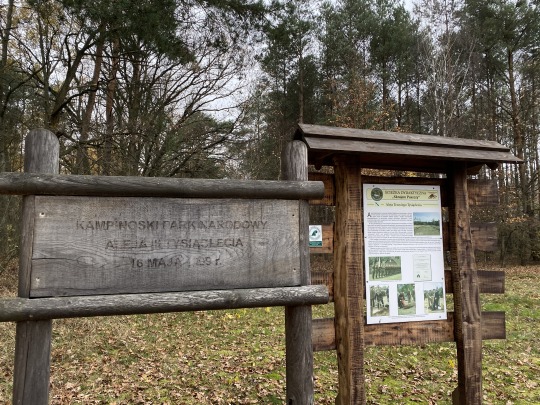




0 notes
Video
youtube
Prezydent Ignacy Mościcki i jego czasy – wystawa Muzeum PW
0 notes